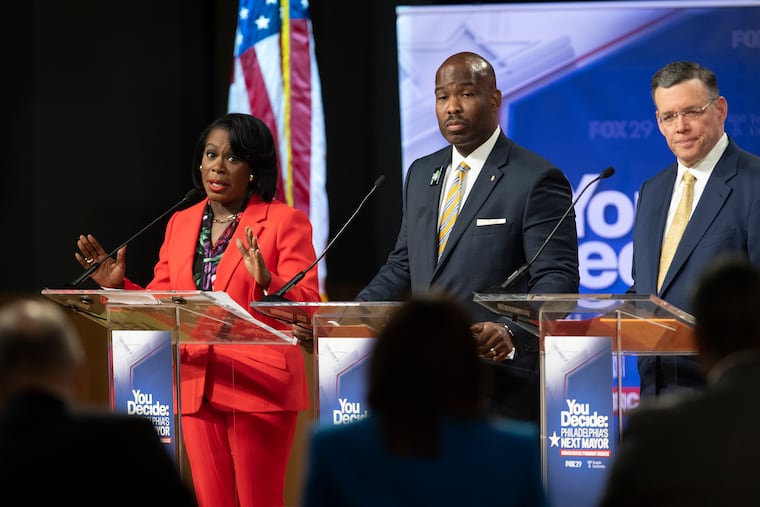Mayoral candidates Parker and Brown promise to use property tax abatements to create affordable housing
Two mayor candidates want to bring back Philadelphia's 10-year property tax abatement if 30% of a developer's units are set aside for affordable housing.

Two mayoral candidates say that if they were elected, they would seek to enact a 10-year property tax abatement for projects that reserve at least 30% of their units for affordable housing.
Both former Council member Cherelle L. Parker and grocer Jeff Brown said they would pursue such a plan.
“We have an immediate and pressing need that the city is not set up to deliver on its own,” said Aren Platt, Parker’s campaign spokesperson. “We need to come up with a way that private industry, which can’t operate at a loss, is incentivized.”
» READ MORE: Councilmember Cherelle Parker held a tight rein on development. What would she do as mayor?
Currently, Philadelphia offers a tax abatement on all new construction, but it is much less generous now than it was two years ago. The current policy phases out over 10 years, reducing the size of the abatement annually until in the last year only 10% of property taxes are exempted.
But a new state law allows for property tax abatements specifically for those who make at least a third of the units available to those who make 60% of area median income or less. ).
The state law requires that local governments pass their own enabling legislation if they want to take advantage of it. Council President Darrell L. Clarke did just that at the end of last year, but in keeping with his vision of hyperlocal control, he designed his proposal narrowly, not for the entire city.
Clarke’s bill would allow such tax incentives only on a narrow strip around North Broad Street. It would be left up to district Council members to decide whether they wanted to opt in any part of their territory.
In a written response to an Inquirer questionnaire sent to all the candidates in April, Parker said she would move beyond the narrow scope currently being considered.
“I am looking to implement HB581 [the state law] citywide to allow for 10-year tax abatement for building new if at least 30% of the housing built is affordable,” said Parker.
» READ MORE: Darrell Clarke’s nearly 25 years on City Council shaped how Philly was built
Most other candidates talked about the existing abatement and the debates around it in response to the questionnaire, but Brown also talked up the 30% affordability requirement in exchange for a full decade property tax break.
“I would consider a citywide 10-year property tax abatement for developers who include affordable housing in their projects,” wrote Brown. “If we are going to give developers a tax abatement, it must be because they are giving back to our communities.”
How the candidates’ proposal fits with the current policy landscape
Parker specifically noted that her proposal would implement a citywide version of the affordable abatement program, something called for by all of the concerned interest groups — from market rate developers to community development corporations.
“We really, really urge you to pass the affordable abatement across the city,” said Carrie Rathmann, director of strategic partnerships for Habitat for Humanity, at a City Council hearing on Clarke’s more limited proposal in late February.
But the hearing also highlighted the political challenges to any attempt to bring back a 10-year abatement. Some neighborhood activists were uncomfortable with Clarke’s narrow version of the affordable abatement, arguing that it would merely contribute to gentrification.
“The 10-year tax abatement is really what developers want,” said Tiffany Green, a longtime community activist from Point Breeze. “This seems like a back-door way of reintroducing the 10-year tax abatement to the scene.”
The original 10-year property tax abatement, which applied to all new construction, became a political lightning rod as redevelopment heated up, especially in the neighborhoods around Center City.
As large and more expensive new homes went up in working class areas that hadn’t seen new development in generations, older residents were outraged that their new, wealthier neighbors were barely paying any property taxes — even as their own monthly costs increased as property assessments soared.
A 2019 compromise halved the value of the 10-year property tax abatement for new construction, but memories of that older policy debate loom large and make even the word abatement toxic in some circles.
At the February hearing, those sentiments were evident from the numerous neighborhood activists who testified against Clarke’s bill. Green said that 30% affordability requirements weren’t enough.
“Do you know what 70% market rate does? 70% market rate increases the housing price, 70% increases the whole area and makes it expensive,” said Green. “So the little 30% actually gets swallowed up.”
At the hearing, Council members Mark Squilla and Kenyatta Johnson amended Clarke’s legislation to opt their whole districts into the new affordable abatement. But the pushback from Green and other foes seemed to give some Council members cold feet and there’s been no movement on the legislation in over two months.
Clarke’s spokesperson said conversations are continuing.
Affordable housing by the private sector?
Parker placed her citywide affordable abatement proposal in the context of her hopes to use vacant city-owned land to build more affordable housing in a mixed-income setting, combining the abatement with proceeds from the construction tax passed in 2020 to subsidize construction. (She also promised to expand the scope of the Basic Systems Repair program, which provides grants for home renovations to low-income property owners.)
Platt said the program could be used both for home ownership units and rentals.
“She recognizes that at least some affordable housing will be built by private developers, and you need to find financial incentives for that,” said Platt. “This is something we can do to get homes built as quickly as possible and create homeowners.”